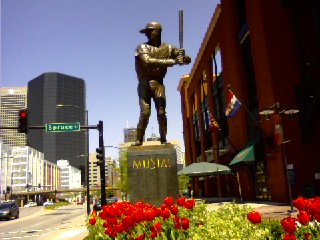|
Twice in his long and splendid career, Stan Musial was rumored to be going to the Yankees.
Once was before he was nicknamed Stan the Man in another borough; the other happened when he was Stan the Elder. Of course, Musial became and remained the great sporting figure of St. Louis, a perfect blend of athlete and a grand old baseball town. On Tuesday, April 17, in the Bronx, I will be discussing the Yankee parallels in my biography, Stan Musial: An American Life, published in 2011 by Ballantine/ESPN. The talk will be at 3 PM in the Bronx Museum of the Arts, 165th St. and the Grand Concourse, part of a Yankee-centric spring baseball lecture series organized by Cary Goodman, the executive director of the 161st Street Business Improvement District. It is a formidable lineup that began Sunday with Arlene Howard discussing her memoir of her husband Elston. Today (Monday) is Kostya Kennedy and his book about 1941. And on Wednesday Howard Bryant and Howie Evans will be talking about Henry Aaron. The full lineup is here: http://www.newyorkology.com/archives/2012/04/bronx_museum_ba.php. I will give my theories why it was good for all concerned that Musial did not become a Yankee. Although, can you imagine him hitting to all corners of the old Yankee Stadium? “If you’re in the neighborhood,” as the broadcasters say in the early innings, please come by and say hello on Tuesday. |
Categories
All
|










